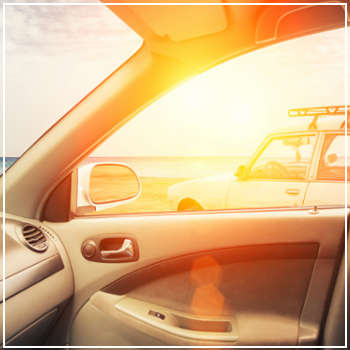When parked in direct sunlight, the temperature inside your car can soar between 145 to 195 degrees Fahrenheit. Over time, this intense heat can lead to cracks, fading, and deterioration in areas such as the dashboard, upholstery, and paint. These issues may seem minor at first, but they can accumulate over the years and significantly impact your car’s appearance and value. The dashboard is one of the most vulnerable parts of your car when exposed to UV rays. As it's positioned right under the windshield, it often gets the most direct sunlight. This can cause the material to fade, crack, and even lose its structural integrity over time. Not only does this affect the look of your car, but it can also compromise the functionality of certain components. Whether your car has leather seats or fabric upholstery, both are susceptible to UV damage. Leather, in particular, can become dry, stiff, and uncomfortable if left in the sun without protection. The natural oils in the leather can be stripped away, leading to cracking and peeling. For those with leather interiors, regular conditioning is essential to maintain softness and prevent premature aging. Fabric seats, while more resistant, will still fade and deteriorate over time with consistent exposure. Exposure to the sun can cause your car’s paint to lose its shine and color. Dark-colored vehicles are especially prone to fading due to oxidation. In addition to the paint, plastic parts like bumpers, headlights, and mirrors can also discolor and develop cracks. This overall wear makes your car look older than it actually is, even with regular washing and waxing. High temperatures and UV exposure don’t just affect the outside of your car—they can also harm internal components. Belts and hoses may start to crack and fray, which could lead to mechanical failures. Fluids like oil, transmission fluid, and antifreeze can evaporate, increasing their viscosity and affecting how well they function. Additionally, extreme heat can cause tire pressure to rise, increasing the risk of a blowout. The best way to protect your car from UV damage is to park it in the shade whenever possible. If you have a garage, use it. Otherwise, consider using a portable car cover or parking under a tree. Keeping your car out of direct sunlight helps maintain its condition and keeps the interior cooler when you return. In addition to parking strategies, there are several other steps you can take: If you're starting to notice signs of UV damage on your car, it's time to take action. DaSilva’s Auto Body offers professional interior and exterior detailing, repainting, and repairs to restore your vehicle’s appearance and performance. Contact our Naugatuck location today to schedule an appointment and keep your car looking great for years to come. Polypropylene Anticorrosion Tape PP anti corrosion tape, Polypropylene anti corrosive tape, Polypropylene membrane tape SICHUAN FOREVER RADIATION TECHNOLOGY CO.,LTD , https://www.fieldjointscoatings.com Ultraviolet light might not always show immediate effects, like a sunburn, but it can still cause long-term damage to your car. While you may not see visible burns on the interior or exterior, prolonged exposure to UV rays and high temperatures can gradually degrade various parts of your vehicle.
Ultraviolet light might not always show immediate effects, like a sunburn, but it can still cause long-term damage to your car. While you may not see visible burns on the interior or exterior, prolonged exposure to UV rays and high temperatures can gradually degrade various parts of your vehicle.Dashboard Damage
Upholstery Wear
Paint Fading and Oxidation
Impact on Interior Components
How to Minimize UV Damage